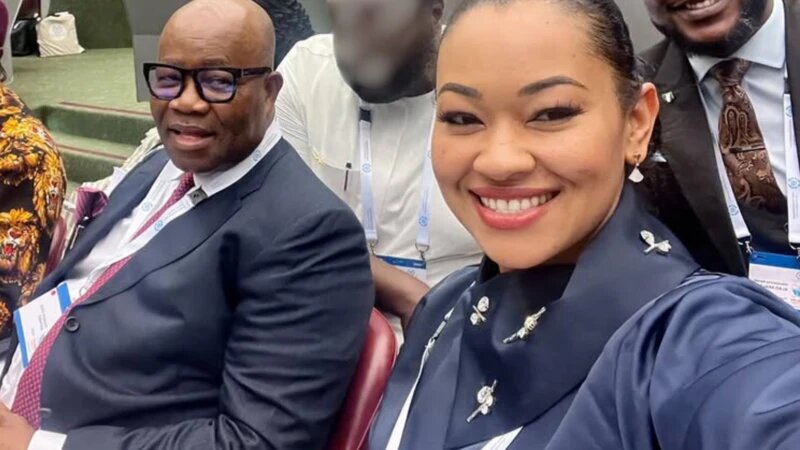Africa
Akpabio/Natasha Saga And The Nigerian Culture Of Blame-Shifting In Sexual Harassment Allegations -By Isaac Asabor
In fact, the reaction to the sexual harassment allegations against Senate President Akpabio reveals a deep-rooted problem in Nigerian society. Instead of holding the accused accountable, many Nigerians, led by women, have chosen to attack the accuser, shifting the focus from the real issue. This is not just an isolated incident; it is part of a larger culture that protects perpetrators and silences victims.

In a country where victims of sexual harassment often struggle to be heard, the recent allegations against Senate President Godswill Akpabio have exposed yet another disturbing trend in blame-shifting and character assassination. Instead of addressing the core issue at hand, which is the alleged sexual harassment, many Nigerians, ironically led by women, have resorted to digging into the accuser’s past, particularly recalling similar accusations made by Senator Natasha Akpoti-Uduaghan in the past.
This reaction is both alarming and counterproductive. Rather than engaging in a serious discussion about the prevalence of sexual harassment in Nigeria and the need for accountability, some Nigerians have taken to social media and public forums to cast aspersions on Natasha, arguing that her past accusations make her current claims less credible. This is a dangerous precedent that discourages victims from speaking out and perpetuates a culture of silence around sexual harassment.
The allegations against Senate President Akpabio are not to be taken lightly. Sexual harassment, especially in high political offices, is a matter of national concern. The Senate President is not just an individual; he is an institution, a representation of the Nigerian legislative arm. If a high-ranking official can be accused of such misconduct, it should trigger an immediate and serious investigation rather than an orchestrated campaign to discredit the accuser.
However, instead of condemning the alleged act and demanding accountability, many Nigerians, particularly some women, have chosen to divert attention. They have shifted the focus from the allegations themselves to Natasha’s history of speaking up against powerful men. The argument being made is that because Natasha has previously accused others of harassment, she should not be believed now. This logic is flawed, dangerous, and indicative of a society that is more interested in shielding perpetrators than protecting victims.
Victim-blaming is not new in Nigeria. When women come forward with allegations of sexual misconduct, they are often met with skepticism, hostility, and accusations of ulterior motives. This is particularly true when the accused is a powerful man. Instead of investigating the claims, the focus shifts to questioning the victim’s character, sexual history, and motives, and even making attempt how she was dressed at the time of the harassment. Woe betide the victim if she was scantily dressed, or reputed to be dressing scantily.
In Natasha’s case, some have referenced her past allegations against other men as a means of discrediting her. This is similar to what happened when Busola Dakolo accused Pastor Biodun Fatoyinbo of rape. Instead of focusing on the accusation, people dug into Busola’s past, questioning her motives and accusing her of seeking fame. This same pattern is playing out in the Akpabio case.
It is no doubt ironic that women are ones leading the diversionary campaign. This raises serious questions about internalized misogyny and the reluctance of women to support fellow women who speak out against sexual misconduct.
In many societies, women are expected to be the first line of defense against sexual harassment. They are supposed to support victims, amplify their voices, and demand justice. However, in Nigeria, the opposite seems to be the case. Women are among the first to cast stones, accusing victims of exaggeration, seeking attention, or outright lying. This attitude reinforces the culture of silence and makes it even harder for real victims to come forward.
Unfortunately, the consequences of this blame-shifting culture are dire. When accusations of sexual harassment are met with personal attacks on the victim, it discourages other victims from coming forward. It also emboldens perpetrators, who see that they can get away with their actions without any real consequences.
Furthermore, it sends a message to young women that their voices do not matter. If a prominent female senator like Natasha can be discredited so easily, what hope is there for the average Nigerian woman facing harassment in the workplace, schools, or public spaces?
Instead of focusing on Natasha’s past or attacking her credibility, Nigerians should be demanding transparency and accountability. The allegations against Akpabio should be thoroughly investigated, and if found guilty, he should face the full weight of the law.
The Nigerian government and civil society must also do more to create an environment where victims feel safe to speak out. This includes enacting stricter laws against sexual harassment, providing support systems for victims, and ensuring that powerful men do not abuse their positions without consequences.
In fact, the reaction to the sexual harassment allegations against Senate President Akpabio reveals a deep-rooted problem in Nigerian society. Instead of holding the accused accountable, many Nigerians, led by women, have chosen to attack the accuser, shifting the focus from the real issue. This is not just an isolated incident; it is part of a larger culture that protects perpetrators and silences victims.
If Nigeria is to progress, this mindset must change. Victims of sexual harassment should be encouraged to speak up, and their accusations should be taken seriously. Instead of blame-shifting, Nigerians must demand justice and accountability, regardless of who is accused. Until this happens, sexual harassment will continue to thrive, and victims will continue to suffer in silence.























